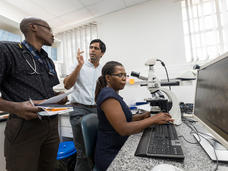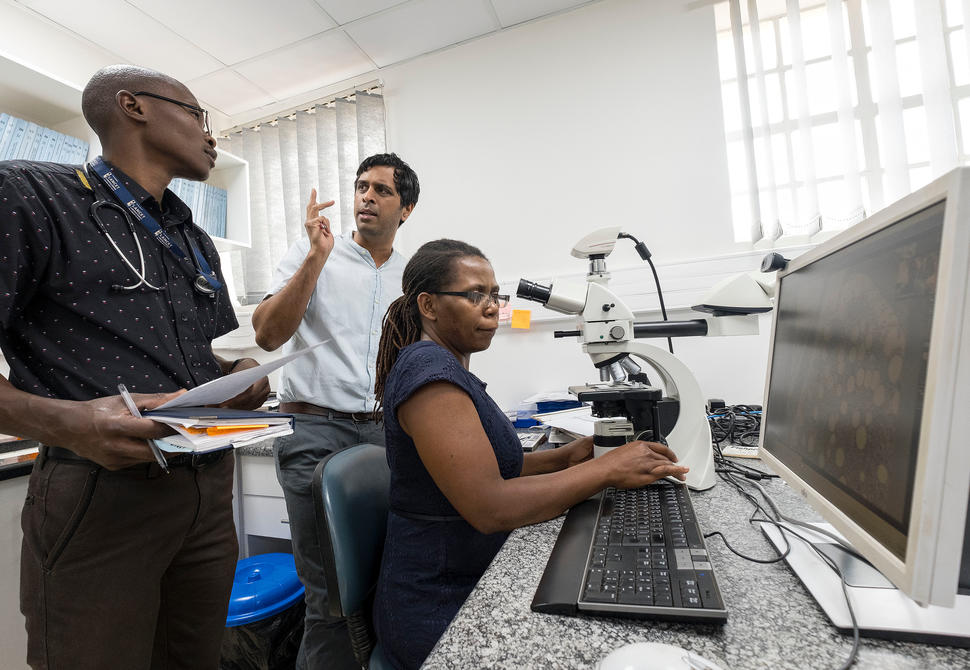, by NCI Staff
In honor of World Cancer Research Day on September 24, Satish Gopal, M.D., director of NCI’s Center for Global Health, discussed his professional journey and the center’s role in reducing the burden of cancer worldwide. Before joining NCI in February 2020, Dr. Gopal was an NIH-supported physician–scientist and director of the cancer program for the University of North Carolina Project-Malawi, in collaboration with the Malawi Ministry of Health.
What drew you to the National Cancer Institute?
I believe NCI represents the greatest concentration of cancer resources and expertise in the world. It’s also true, I believe, that the world expects NCI to play a key leadership role in addressing cancer as a global public health problem. The opportunity to help participate in that important work—specifically, by leading the Center for Global Health—is what drew me to NCI.
How did your time in Malawi shape your views about how to address cancer?
My family and I had an amazingly rich professional and personal experience in Malawi, which from an economic viewpoint is one of the poorest countries in the world. Developing a successful cancer research program there, as an NCI-funded extramural physician—scientist, while also being immersed in the difficulties of public sector cancer control in a low-income country, was a unique experience.
I truly am drawing on these experiences daily since coming to NCI—taking care of patients with cancer, mentoring young investigators, conducting locally and globally impactful research, developing equitable collaborations with local investigators and institutions. This lived experience will be invaluable for me in formulating new directions for the Center for Global Health, toward helping NCI have a global impact against cancer. I struggle to imagine how I could do this job effectively without these experiences.
How does the burden of cancer differ between the United States and countries around the world?
To begin with, 60%–70% of all cancers worldwide occur in low- and middle-income countries (LMICs), so this is where most of the global cancer burden resides. This proportion is increasing, due to population growth and aging in LMICs, as well as increasing cancer incidence rates in many LMICs.
Apart from the overall burden, the incidence of specific cancers also differs markedly in different geographic settings. Some cancers, like prostate and breast cancer, are common worldwide and across diverse populations. Other cancers, such as Burkitt lymphoma in children, occur frequently in some parts of the world but not in others, often due to different environmental or possibly genetic factors.
Finally, health systems vary dramatically around the world, with very different levels of available infrastructure for cancer research and control in different geographic settings.
What is NCI’s role in addressing or studying these disparities?
I personally believe that the cancer research community has a moral responsibility to address cancer as a global public health problem, and clearly my academic life as a physicianscientist before coming to NCI reflects this personal view.
But even absent this responsibility, I believe that studying cancer in the United States alone diminishes the universe of potential scientific discovery. Equitable global collaborations can help improve cancer control efforts worldwide, while generating new cancer knowledge that can benefit people everywhere. I believe NCI should help lead these efforts, and such a belief is in part why the institute created a dedicated Center for Global Health in 2011.
NCI’s resources, expertise, and international reputation provide unique opportunities for it to catalyze and accelerate global cancer research and control in ways that would simply not be possible without its participation in these larger international endeavors.
What are your priorities for NCI’s global health program?
At the Center for Global Health, we support NCI’s mission by advancing global cancer research and by coordinating NCI engagement in global cancer control. We hope to reduce worldwide suffering from cancer through global scientific discovery and dissemination of scientific findings. Our work is primarily focused around four main goals.
First, we support innovative, impactful research that addresses key scientific issues in global cancer control and/or leverages unique scientific opportunities afforded by global collaboration. Second, we support global cancer research training, particularly in LMICs, that enables global scientific collaboration. Third, we promote the integration of current scientific knowledge in global cancer control. And fourth, we represent NCI and promote its engagement with key partners in global cancer control.
We have ongoing activities and programs in development in each of these areas, and we are also initiating a more comprehensive strategic planning process to guide the center’s portfolio as we approach its 10th anniversary next year.
How important are partnerships and collaboration in achieving your goals for the Center for Global Health?
Partnerships and collaboration have been critical for the Center for Global Health since its creation in 2011. Global cancer control is an enormous undertaking. It cannot be accomplished by NCI alone, nor should it be even if this were possible, because truly sustained progress requires equitable participation by many diverse stakeholders.
We work with many international and domestic partners, both governmental and nongovernmental, toward shared global cancer control objectives.
One particularly notable group of partners is the NCI-Designated Cancer Centers. Over the past decade, a number of these cancer centers have dramatically increased their global activities to pursue new scientific opportunities and to promote the academic interests of their investigators and trainees.
What do you see as the biggest opportunities for making progress against cancer globally?
There are, in fact, major opportunities across the cancer control continuum, and across the basic, clinical, and populations sciences, including research to study the optimal methods for promoting the uptake of evidence-based cancer control interventions in diverse global settings.
There are also opportunities to better understand cancers that occur with unusually high frequency in different parts of the world—such as the work NCI is supporting in HIV-associated malignancies in sub-Saharan Africa, where these cancers are most common—as well as opportunities to better understand common cancers when they occur in diverse populations.
Developing new, affordable, and implementable technologies for cancer screening, diagnosis, prognosis, and treatment monitoring is another area where I think great progress can be made. For example, we have supported such efforts through NCI’s Affordable Cancer Technologies program, which has helped accelerate the development of technologies for treating cervical precancer and planning advanced radiotherapy in LMICs.
An additional area where there is great interest and opportunity is the development of new treatment approaches that incorporate novel agents that may be effective and more easily implemented in LMICs than standard treatments.
What are some of the biggest challenges to making progress?
The biggest challenge in many LMICs is limited health system capacity for cancer care and research. This also includes low levels of support for cancer researchers early in their careers. That support is needed to allow these investigators to ask and answer the important questions that really matter in the environments in which they live and provide care, and thereby generate broadly applicable new knowledge. These challenges cannot be solved by NCI alone, but certainly NCI can play an important role in addressing these challenges through sustained and strategic investment.
Are you optimistic about the coming years in terms of preventing and treating cancer globally?
I truly believe there are enormous opportunities to do transformative global cancer research in the years ahead that can improve people’s lives everywhere. NCI is in a unique position to lead these efforts, and I’m grateful for the opportunity to help guide these efforts.
How would you describe the impact of the coronavirus pandemic on people with cancer worldwide and global health research?
Worldwide, COVID-19 is disrupting cancer services and causing high rates of illness and death among patients with cancer who become infected. It is also diverting funding, personnel, and attention away from other pressing public health problems, such as cancer.
These are issues even in high-income countries like the United States. In many LMICs, health systems were not well equipped to deal with cancer at a population level even under the best of circumstances and even before COVID-19. In such environments, COVID-19 will likely be a continuing threat to cancer research and control for years to come, particularly as the pandemic has begun to escalate in some LMICs.
I’ve been impressed by how the staff at NCI and the Center for Global Health have retained a remarkable focus on their primary mission of cancer research, even during these challenging times.








